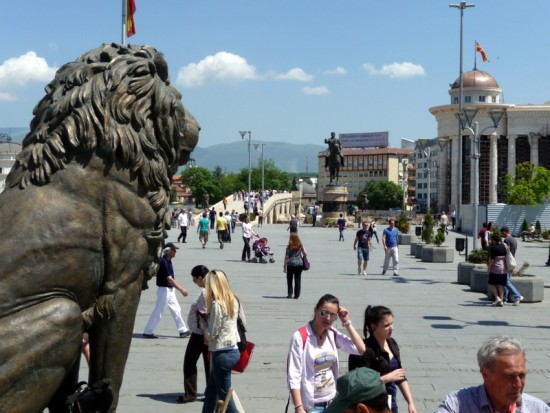Macedonian Politicians Deny Telecom Bribe Claims
Senior Macedonian politicians have dismissed new court testimony that alleges they took huge bribes in relation to Deutsche Telecom.

Former Prime Minister Vlado Buckovski and the leaders of the junior ruling party, the Democratic Union for Integration, DUI, have rejected allegations contained in testimony recently made public by a US court that they took bribes to help Deutsche Telecom keep its monopoly on the Macedonian market.
The testimony by Slobodan Bogoevski, former Macedonian Deputy Secretary for State Security, is dated December 28, 2014.
It alleges that Buckovski, together with the head of the DUI, Ali Ahmeti, and the party’s vice president, Musa Xhaferi, each took €2.5 million in bribes, amounting to a total of €7.5 million.
“Bogoevski has presented a series of incorrect information and… tendentious constructions,” Buckovski said.
He said he could not comment further and had already been cross-examined on this issue in February 2014 in Washington on the request of the US Securities and Exchange Commission.
“This is absolutely not true and is being actualized as part of a filthy campaign of lies and fictions in the service of the forthcoming early elections,” the DUI party said at the weekend.
Bogoevski’s testimony was published by the US District Court from the Southern District of New York as part of a Foreign Corrupt Practices Act case launched by the US Securities and Exchange Commission against three former Magyar Telekom executives, Elek Straub, Andras Balogh and Tamas Morvai.
Straub and the two other former executives are suspected of authorizing the bribe payments in exchange for regulations designed to delay the entry of competitors onto the mobile phone market in Macedonia.
According to Bogoevski, “The key players were Elek Straub, [Greek businessman Dimitris] Kontominas and Vlado Buckovski”.
Bogoevski said he was the link, arranging the first meetings between Kontominas, who allegedly acted upon Straub’s instructions, and the then Macedonian Prime Minister, Buckovski.
According to the testimony, the “Greeks” offered the bribes in January 2005 after which the “Macedonian side” and Straub signed two secret agreements in May 2005. The first, a cooperation protocol, stipulated the concessions made by Macedonia in the telecom market, and another one, a “non-paper”, contained the time frame for the payment of the bribes without mentioning concrete names.
These secret deals, according to US court documents, prevented competitors from entering the Macedonian market for another two years.
According to Bogoevski, the documents, which have also been provided as evidence to the US court, do not contain names and instead refer to “Party A” for the Macedonian Prime Minister and to “Party B” for Magyar Telekom and the people round Kontominas.
The payment of the bribes allegedly went through bogus consultancy contracts signed with companies owned by Kontominas.
Kontominas allegedly took the cash and gave it to a specially appointed person from the Macedonian side who handed the money to the Prime Minister in person, for which the transporter allegedly got signed receipts.
In order to freely pass the border, the delivery man was formally given a state office and diplomatic immunity in Macedonia, Bogoevski claims.
The money intended for the DUI leaders, who had no special tasks but who Bogoevski says were simply in it for the money, was allegedly taken directly to Tetovo in western Macedonia, the seat of the party HQ.
Macedonia sold 51 per cent of the former state-owned telecom firm to Deutsche Telekom in 2000. The business is now operated as a division of Magyar Telecom.
Following two investigations by the US authorities into Deutsche Telekom’s dealings in Macedonia, in 2011 Deutsche Telekom and Magyar Telekom paid the US Department of Justice and the Securities and Exchange Commission a combined penalty of $95.1 million in out-of-court settlements.
However, no current or former government officials in Macedonia have been investigated over the case.
Only four individuals have been charged by prosecutors in Skopje over the telecom affair. All are foreign citizens. The charges against one of them were recently dropped. The remaining three have never been brought before a court. The charges were filed in 2008.
Bogoevski is convicted in Macedonia for taking bribes in an unrelated case. He insists that the case against him was set up to silence him from speaking out on corrupt politicians.
BalkanInsight
9 September 2015
